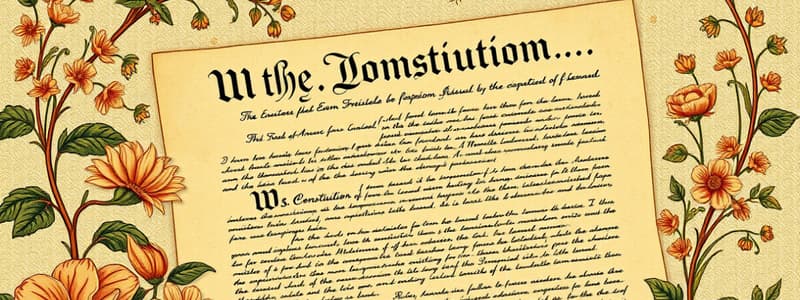Podcast
Questions and Answers
What was one major difference between the U.S. Constitution and the Articles of Confederation concerning federal power?
What was one major difference between the U.S. Constitution and the Articles of Confederation concerning federal power?
The U.S. Constitution strengthened the power of the Federal Government.
How did the Constitution address the issue of interstate and foreign commerce?
How did the Constitution address the issue of interstate and foreign commerce?
The Constitution granted Congress sole control over interstate and foreign commerce.
Describe the separation of powers established by the U.S. Constitution.
Describe the separation of powers established by the U.S. Constitution.
The Constitution created three separate, independent branches of government.
What crucial change did the Federalists advocate for in relation to taxation?
What crucial change did the Federalists advocate for in relation to taxation?
What were the main concerns of the Anti-Federalists regarding the Constitution?
What were the main concerns of the Anti-Federalists regarding the Constitution?
What is the purpose of the Bill of Rights?
What is the purpose of the Bill of Rights?
How does the 14th Amendment relate to the Bill of Rights?
How does the 14th Amendment relate to the Bill of Rights?
What was the significance of John Peter Zenger's trial regarding freedom of the press?
What was the significance of John Peter Zenger's trial regarding freedom of the press?
Flashcards are hidden until you start studying
Study Notes
U.S. Constitution vs. Articles of Confederation
- The Constitution significantly strengthened the Federal (national) Government compared to the Articles of Confederation.
- Congress was granted sole control over interstate and foreign commerce, enhancing trade regulation.
- Introduction of three independent branches of government under the Constitution reinforced checks and balances.
- The power to collect taxes was given exclusively to the Federal Government, allowing for consistent revenue generation.
Similarities
- Both documents established a national legislature, serving as the lawmaking body for the country.
- Each provided a framework for interstate cooperation, though the Constitution improved the efficacy of this cooperation.
Federalists
- A group advocating for the ratification of the U.S. Constitution, promoting a robust national government for societal order.
- The Federalist Papers were published to argue in favor of ratifying the Constitution, playing a crucial role in public persuasion.
Anti-Federalists
- Opposed the ratification of the Constitution due to concerns over individual rights and excessive national government power.
- Their agreement to ratify was contingent upon the inclusion of the Bill of Rights, ensuring protections for citizens.
Bill of Rights
- Comprises the first ten amendments to the U.S. Constitution, primarily aimed at safeguarding civil liberties.
- Serves to protect individuals from potential government overreach, mirroring principles found in the Declaration of Independence.
Major Protections
- The Fourth Amendment protects against unreasonable search and seizure, a reaction to British practices during colonial times.
- The 14th Amendment extends Bill of Rights protections to state actions, ensuring states also adhere to these rights.
- Major rights include the right to peaceful assembly, freedom of speech, and protection against arbitrary search and seizure.
First Amendment
- Establishes the principle of separation of church and state, asserting that religion should remain distinct from government affairs.
- The freedom of speech is highlighted, evidenced by the Zenger trial in 1733, which set a precedent for freedom of the press after Zenger’s acquittal for publishing factual criticism of a governor.
Studying That Suits You
Use AI to generate personalized quizzes and flashcards to suit your learning preferences.




